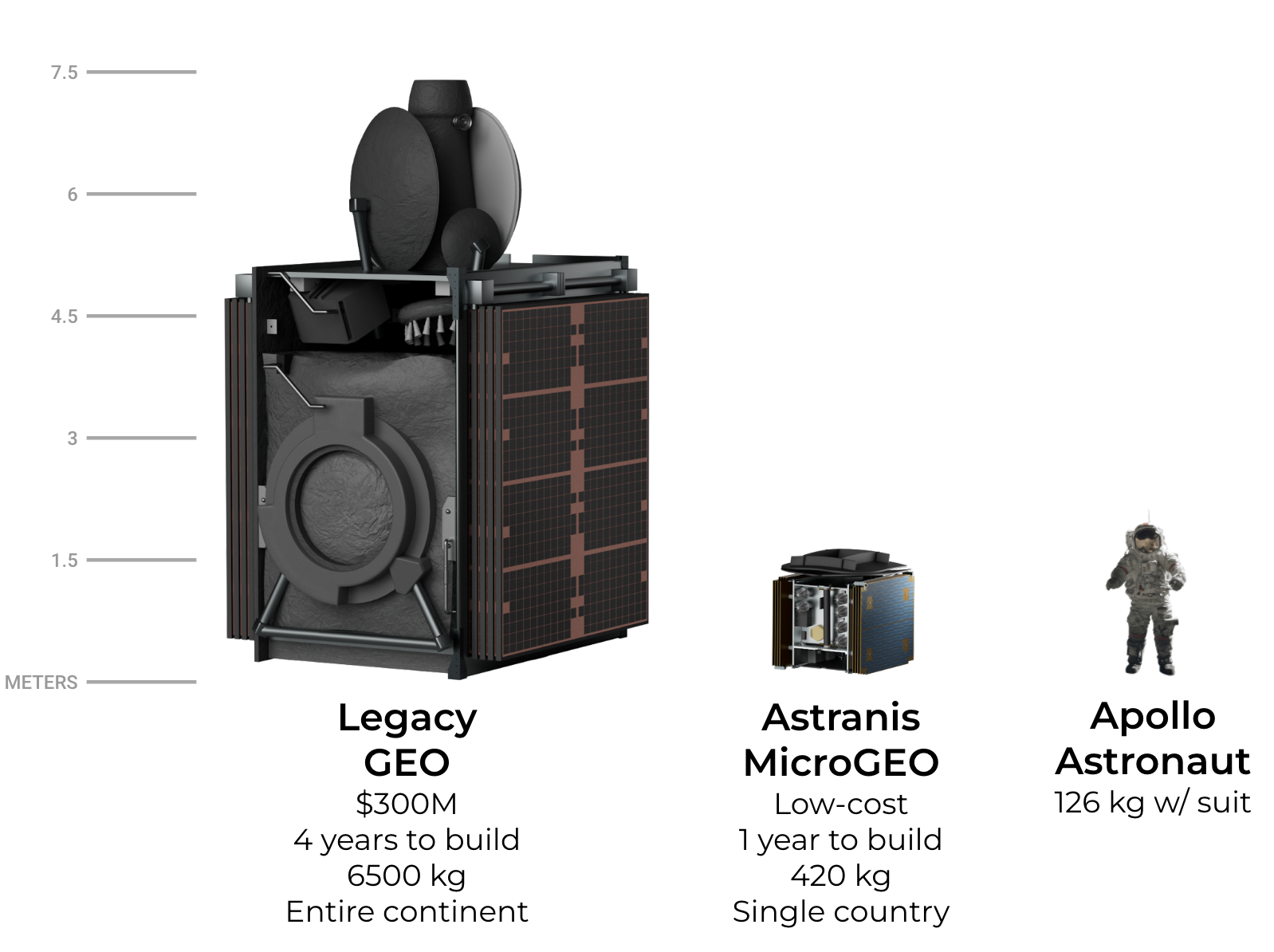San Francisco-based startup Astranis has purchased a dedicated launch on a SpaceX Falcon 9 rocket, eschewing the less expensive “ride-share” model favored by new space companies for an exclusive mission that Astranis says will put its package of four communications satellites closer to their target orbit in a much faster amount of time.
“We’re actually using substantially less than the max capability of a Falcon 9,” Astranis CEO and founder John Gedmark explained. “This is just four small satellites that [will be] on there. So we’re actually able to use all of that extra performance to put those four satellites much closer to GEO than you would normally be able to do with with this kind of launch.”
How much faster? At least twice as fast, cutting down the time from up to six months to as little as three months. Purchasing a dedicated launch on a Falcon 9 — a first amongst space companies — also means that Astranis will have much more control over when the rocket takes off and the payload insertion orbit.
Astranis manufactures MicroGEO satellites, so named because they are much smaller and lighter than the typical geostationary communications satellites that are in orbit today, coming in at around 1/20th the size and cost. The geostationary piece is key: while many companies, including SpaceX, are looking to commercialize low-cost satellite internet broadband in low Earth orbit, Astranis plans to send its spacecraft to geosynchronous orbit, the band where companies like ViaSat currently operate. Once placed in GEO, each satellite will service one area, following a fixed rotation with the Earth’s surface.

Image Credits: Astranis (opens in a new window)
“We’re huge fans of what some of these other companies are trying to do with LEO constellations — it’s just a very different approach,” Astranis CEO and founder John Gedmark told TechCrunch previously. “We have the ability to put up one satellite at a time and focus bandwidth right where it’s needed, and do that quickly. The smaller constellations, they are very much an all-or-nothing proposition — the entire constellation has to be in place to begin service. And then they have some other challenges ahead of them as well, like ground antennas, unique tracking.”
Astranis’ first satellite, called Arcturus, will launch on a SpaceX Falcon Heavy ride-share mission sometime this summer. When that satellite enters service later this year, the capacity will be leased exclusively to Alaskan satellite middle-mile provider Pacific Dataport Inc. Astranis said it will triple Alaska’s currently available satellite bandwidth while providing cheaper and more reliable broadband.
The four satellites that will launch on the Falcon 9 next summer also have dedicated customers: one will deliver broadband internet access to rural Peru in a $90 million agreement with Latin American telecom company Grupo Andesat; and two will be leased to Anuvu, a company that provides internet connectivity on airplanes and cruises. A separate customer that has yet to be announced will lease the bandwidth from the fourth satellite. The four satellites launching next summer will include a number of technical upgrades, including some upgrades on the radio payload and the propulsion system which will extend the lifespan of the spacecraft.
As all of these deals illustrate, Astranis’ business model is a bit different than other communications satellite operators. Instead of selling directly to consumers (again, à la Starlink), the company leases out bandwidth to communications providers, who then sell the internet connectivity directly to consumers.
“A lot of people are mobile first,” Gedmark said. “They have phones, they have smartphones, and they’re still stuck on 2G internet connections on those phones.” Instead of selling those people internet packages or hardware, Astranis aims for its satellites “to provide extra capacity for cell backhaul,” he said. “By boosting the capacity for cell backhaul, you allow telcos to expand their coverage areas and cell towers out in the most remote places in the entire world.”
The company, which aims to have 100 MicroGEO satellites in orbit by 2030, raised $250 million in a round led by BlackRock-managed funds and which catapulted its post-money valuation to $1.4 billion. Since then, Astranis has scaled to around 250 people, and is in the process of kickstarting a new, 150,000 square foot factory, a historic building it is subleasing from ride-share giant Uber. The four satellites that will be launching next summer will be manufactured there.
Correction: The Falcon Heavy rocket launch will take place this summer, not this spring as originally stated.
